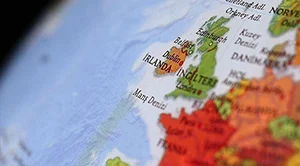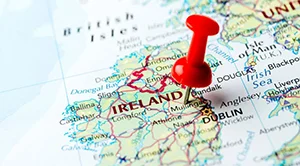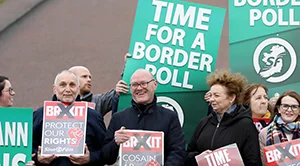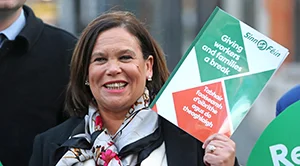 If you like an occasional flutter, you have probably noticed that most leading sportsbooks in the UK offer betting markets on local politics. The Irish reunification is one of the most thought-provoking examples. Covered in lush grasslands, this island (the second largest in Europe) is geopolitically partitioned into the Republic of Ireland and Northern Ireland.
If you like an occasional flutter, you have probably noticed that most leading sportsbooks in the UK offer betting markets on local politics. The Irish reunification is one of the most thought-provoking examples. Covered in lush grasslands, this island (the second largest in Europe) is geopolitically partitioned into the Republic of Ireland and Northern Ireland.
The former occupies the larger portion of the island and is a sovereign state with a bicameral parliament, a president, and a membership in the EU. The latter is a constituent part of the United Kingdom largely under the governance of the British monarch and parliament. It makes sense the unification of the Emerald Isle is a coveted dream of many Irish nationalists.
The question arises is this an achievable goal and if yes, by when. While we hate to come across as a negative Nancy, the chances of a reunification approval via a dual-border referendum before 2030 are not looking particularly great, at least according to bookmakers. But before we look further into the bookies’ unification pricing, let’s see why there was a partition in the first place.
Why Is There an Irish Partition?
 Ireland first fell under British rule in the 16th century and it was during this period that Protestant settlers started to flood the island. The conquest had a two-fold effect. On one hand, it created religious animosity between the Irish Catholics and the English Protestants. On the other hand, it subordinated the local population to the central British government.
Ireland first fell under British rule in the 16th century and it was during this period that Protestant settlers started to flood the island. The conquest had a two-fold effect. On one hand, it created religious animosity between the Irish Catholics and the English Protestants. On the other hand, it subordinated the local population to the central British government.
After years of violence, famine, and rebellions, the situation culminated into the Easter Rising of 1916, which in turn led to the creation of Northern Ireland under the Government of Ireland Act of 1920. The Emerald Isle was thus split into two factions, Northern Ireland and the nationalist Republic of Ireland.
The Prime Minister’s message on Northern Ireland’s centenary year. pic.twitter.com/g8CgvNeehL
— UK Prime Minister (@10DowningStreet) May 3, 2021
Legal Considerations for Holding Dual Border Polls
 Brexit has caused a great shift in opinions, with support levels for reunification growing over the last few years. Over half of the Northern Irish were against a withdrawal from the EU during the 2016 referendum, an outcome that has resulted in demands for revisiting the region’s future.
Brexit has caused a great shift in opinions, with support levels for reunification growing over the last few years. Over half of the Northern Irish were against a withdrawal from the EU during the 2016 referendum, an outcome that has resulted in demands for revisiting the region’s future.
Under the terms of the Good Friday Agreement, the population of the Emerald Isle has the right to bring about unification but only on condition people in both the Republic of Ireland and Northern Ireland support the move in dual-border polls.
Northern Ireland residents first went to the polls to cast their votes for or against reunification in March 1973. A staggering 98.9% supported the idea of staying in the United Kingdom, much to the displeasure of nationalists, who attributed this outcome to the low voter turnout of 58.7%.
Opinion polls must indicate a consistent unification majority in the NI
The Good Friday Agreement (GFA) stipulates the secretary of state has the right to enable a referendum whenever it appears the majority of voters want Northern Ireland to break away from the UK and reunite with the Republic of Ireland.
Several requirements must be fulfilled for this to happen. The most important one is for opinion polls to show the Northern Irish majority consistently supports the idea of leaving the UK. If this happens, the secretary would be legally obligated to enable a referendum, or a border poll as they call it.
Several other factors can also be interpreted as proof of majority support in NI. These include a majority vote in the Northern Ireland Assembly, the number of seats nationalists have won in general elections, and demographics.
Demographics also matter
 The demographic factor has to do predominantly with the proportion of Catholics to Protestants. The last official census from 2011 showed approximately 48% of the Northern Irish population identified themselves as Protestants as opposed to 45% who considered themselves Catholics.
The demographic factor has to do predominantly with the proportion of Catholics to Protestants. The last official census from 2011 showed approximately 48% of the Northern Irish population identified themselves as Protestants as opposed to 45% who considered themselves Catholics.
The newest census took place in March 2021 but the public will see the results no sooner than June this year. If the Catholic population equals or outnumbers Protestants in the region, this might further tip the scales in favour of another border poll. Should it get defeated, the NI secretary of state must wait a minimum of seven years before he or she can hold another reunification referendum.
Border Polls in the Republic of Ireland
The Good Friday Agreement provides no specific provisions concerning the mechanisms necessary to set off a border poll in the Republic of Ireland. Nonetheless, the Irish Constitution, also known as Bunreacht na hÉireann, distinguishes between two referendum types, ordinary and constitutional.
Changes to the constitution call for constitutional referendums after being approved by the Irish legislature, the Oireachtas. Ordinary referendums can take place in cases of bill proposals that have failed to gain approval from the Irish president, one-third of the lower chamber, and half of the upper chamber.
The trouble is neither of these mechanisms seems suitable for unification-related border polls. The GFA suggests border polls should take place on the principle of unification prior to any negotiations and legislative proposals. What further complicates things is that if said proposals and negotiations come to pass, they would most likely call for constitutional changes, which in turn would require another referendum.
Most Irish Lean towards Reunification, Recent Poll Suggests
 A recent study conducted by the research group Ipsos on behalf of The Irish Times gives us insights into what the Irish public thinks about the subject of reunification. The results suggest most people of voting age in the Republic support the idea of a united Ireland.
A recent study conducted by the research group Ipsos on behalf of The Irish Times gives us insights into what the Irish public thinks about the subject of reunification. The results suggest most people of voting age in the Republic support the idea of a united Ireland.
When asked how they would vote in a prospective referendum, as many as 62% responded they would back the reunification of Northern Ireland and the Republic of Ireland as opposed to 16% who spoke against a NI-UK break up. The rest either had no opinion on the subject or said they would not participate in the referendum.
| Unification Support Levels Based on Political Affiliation | |||
|---|---|---|---|
| Party | In Favour | Against | Undecided |
| Fianna Fail | 63% | 20% | 9% |
| Fine Gael | 58% | 22% | 12% |
| Green Party | 67% | 18% | 12% |
| Labour Party | 63% | 19% | 11% |
| Sinn Fein | 78% | 8% | 8% |
| Voters Supporting Other Parties | 62% | 19% | 13% |
Source: Ipsos MRBI Poll for The Irish Times
As is to be expected, people who favour the nationalist party Sinn Fein showed the highest levels of support at 78%, followed by green voters at 67%. Fine Gael and Labour supporters were less enthusiastic about the prospect of unification at 58% and 63%, respectively. Young people within the 25-34 age group were keener on the idea of a united Ireland.
“I am part of the young generation who will not only end the partition of Ireland, but who will build the post partition Ireland.” https://t.co/4D5HuFLBQS
— YesForUnity (@UnityYes) February 8, 2022
As for gender, more males (64%) than females (61%) said they would vote in favour of reunification in case of a referendum. A regional breakdown of the Ipsos survey results indicates residents based in urban areas are more prone to back Northern Ireland’s withdrawal from the UK as opposed to those who live in rural parts. Dubliners boast the highest support levels at 68%, followed by the Munster, Ulster, and Connacht regions.
| Unification Support Levels by Region | |||
|---|---|---|---|
| Region | In Favour | Against | Undecided |
| Dublin | 68% | 13% | 12% |
| Munster | 61% | 18% | 14% |
| Ulster/Connacht | 55% | 20% | 16% |
| Urban Population | 65% | 16% | 12% |
| Rural Population | 59% | 17% | 14% |
| Unification Support Levels by Gender | |||
| Gender | In Favour | Against | Undecided |
| Male | 64% | 18% | – |
| Female | 61% | 15% | 16% |
| Unification Support Levels by Age Group | |||
| Age Group | In Favour | Against | Undecided |
| 18 to 24 | 56% | 20% | 15% |
| 25 to 34 | 67% | – | 12% |
| 35 to 49 | 64% | 15% | 14% |
| 50 to 64 | 58% | 22% | 12% |
| 65 or older | 66% | 15% | 12% |
Source: Ipsos MRBI Poll for The Irish Times
The Ipsos survey also included a question on how important reunification is to the population. Judging by the answers, most Irish do not consider it a priority. Around 20% of the total survey participants described the matter as very important compared to 24% who said they found it of no importance whatsoever. Over half would like to see unification become a reality someday, but do not consider it all that important.
Since the reunification would naturally have various economic and political implications, the Irish were also asked about the sacrifices they were willing to make for unity. A staggering 78% frowned at the notion of paying higher taxes in case of reunification. A slightly higher percentage dispelled the possibility of agreeing to reductions in public spending.
The Irish showed equal reluctance when it came to compromising on symbolic matters without a direct impact on their finances. The prospect of changing the country’s national anthem so that it better corresponds to the united nation’s identity did not appeal to 72% of the Irish.
| Opinions on Tax Increase, Public Spending Cuts, and New Anthem/Flag in Case of Reunification | ||
|---|---|---|
| Prospective Changes in Case of Reunification | Willing to Accept Change | Unwilling to Accept Change |
| Tax Increase | 15% | 78% |
| Public Spending Cuts | 13% | 80% |
| Change of National Flag | 16% | 77% |
| Change of National Anthem | 21% | 72% |
Source: Ipsos MRBI Poll for The Irish Times
Mainland Britons Seem Unfazed by the Prospect of NI Departure
 Britons are more nonchalant in their sentiments on a potential Ireland reunification as data from YouGov shows. In March 2020, the opinion polling site conducted a survey among 1,743 adults from Great Britain and the results indicated mainland Brits consider themselves to have less in common with the Northern Irish population, expressing overall support for the region’s secession from the union.
Britons are more nonchalant in their sentiments on a potential Ireland reunification as data from YouGov shows. In March 2020, the opinion polling site conducted a survey among 1,743 adults from Great Britain and the results indicated mainland Brits consider themselves to have less in common with the Northern Irish population, expressing overall support for the region’s secession from the union.
It appears there has been a shift in the general public’s opinion as the British population seemed largely unsupportive of the measure in the past. The tables have apparently turned over the last couple of years judging by the YouGov poll results in question.
Supporters of the Liberal Democrats and the Labour Party encouraged the idea of a border poll more than Conservative voters, who generally opposed the measure. Despite the support for holding a border poll, more survey participants leaned towards Northern Ireland remaining in the UK.
The percentage of those in favour of unification stood at 27% compared to 37% against. Conservative supporters are the least likely to back the NI exit from the UK, with 47% against and 25% for leaving. The opposite sentiments are to be observed among Labourist voters who supported the unification, albeit by a small margin of two percentage points.
When asked how they would feel if the reunification indeed took place, a meagre 11% responded they would be pleased. This course of events would upset 24% of mainland Britons, while another 11% said they had no opinion on the matter. More than half of the general population said Northern Ireland’s withdrawal would not bother them.
| Mainland Opinions about Holding a NI Border Poll | ||
|---|---|---|
| By Group | In Favour of Poll | Against Poll |
| General Public Opinion | 36% | 25% |
| Labour Supporters | 48% | 21% |
| Liberal Democrats Supporters | 43% | 28% |
| Conservative Supporters | 32% | 30% |
| Mainland Support for NI Departure from the UK | ||
| By Group | In Favour of Departure | Against Departure |
| General Support Levels | 27% | 37% |
| Labour Supporters | 33% | 31% |
| Liberal Democrats Supporters | 32% | 35% |
| Conservative Supporters | 25% | 47% |
| Mainland Britons’ Feelings about NI Departure | ||
| Sentiment | March 2020 | October 2019 |
| Pleased | 11% | 9% |
| Upset | 24% | 41% |
| Unbothered Either Way | 54% | 41% |
| No Opinion | 11% | 10% |
Source: YouGov.co.uk
As for the exact timing of the potential departure, around 14% think the unification will become a fact within five years, i.e. by 2025. The prevalent opinion is that Northern Ireland will leave the UK within the following fifty years, with 29% believing this would happen in a decade’s time.
The general disinterest shows through even more when you take a look at the answers to some of the other survey questions. Part of the reason for this indifference is that respondents from England (the UK’s biggest constituent country) think they have less in common with the peoples across the Saint George’s and the North Channels.
We can observe similar tendencies throughout Britain as 40% of the mainland population believe Northern Ireland shares more similarities with Ireland than the UK. The divide is understandable, considering many Britons also have a rudimentary knowledge of Ireland’s history.
Only 6% of the mainland survey respondents said they have studied the Irish Home Rule movement while at school. By contrast, a considerably larger portion had studied other topics like the Second World War and the Rule of the Tudors.
How Will Ireland Benefit from Unification
 Proponents of united Ireland are confident the island would see various benefits, starting with less congestion of the local economy. The economy of the Republic of Ireland mostly revolves around the capital Dublin, which is also the country’s biggest and most densely populated city.
Proponents of united Ireland are confident the island would see various benefits, starting with less congestion of the local economy. The economy of the Republic of Ireland mostly revolves around the capital Dublin, which is also the country’s biggest and most densely populated city.
Reunification could offset Dublin’s economic congestion
Other cities like Galway and Cork struggle to live up to the capital in terms of investment appeal. Some argue Belfast could counterbalance the situation given its rich history and different political background. A reunification would not only enable the employment flow from the capital to Belfast but could bring in new companies up north, offsetting Dublin’s economic congestion.
Northern Ireland would automatically regain its EU membership
The UK’s withdrawal from the European Union has sparked a slew of debates about the island’s reunification, and rightfully so. A unity between the north and south would bring about a full EU membership for the whole of the Emerald Isle.
EU leaders assured in 2017 Northern Ireland would automatically gain EU membership in the event of unifying with the Republic, which is already a member. The entire island would thus benefit from the free flow of goods, work hand, services, and capital within this single market.
Unification would mean more independence in terms of foreign and domestic policy-making
Last but not least, unification would pave the way for independence when it comes to foreign and domestic policies. Locally elected politicians would do the decision-making in the event of reunification. The latter would also allow for better coordination in terms of economic development, which in turn could bring in more investments, jobs, and revenue from taxes.
I look forward to the end of London rule here & to the liberation of the unionist people along with the rest of us. Then without the backing of English politicians they will join everyone else to forge a new future based on equality. Speed the day.
⬇️⬇️https://t.co/otidtYkk6X pic.twitter.com/UfMJ1hmFXK
— Gerry Adams (@GerryAdamsSF) February 13, 2022
Those in opposition of the measure frequently cite the potential negative consequences for the economy up north where subvention is already a fact. Northern Ireland indeed suffers from a fiscal deficit since public spending is higher than the revenue the region generates from taxes.
Opponents fear subvention in Northern Ireland
Nonetheless, some economists believe the deficit is not as pronounced as it initially appears because official statistics tend to undervalue the corporate taxes generated by companies up north. Unification proponents also draw parallels with what happened after the Berlin Wall fell.
They say the economically weaker region involved in one such transition can weather out the negative consequences of reunification with the help of EU funding. Similarly, East Germany was less developed than West Germany but has significantly improved its economy since the early 1990s through EU support.
Odds and Betting Markets for Ireland Unification
Next, we shall examine the unification markets available at four renowned UK-licensed sportsbooks since oddsmakers sometimes deliver more accurate predictions than opinion polls. Irish bookie Paddy Power and Betfair are unanimous in their prognosis, estimating the probability of a vote on united Ireland to pass by early January 2024 at a little over 33%.
Both betting companies price this outcome at 2/1 and these decent odds are driven by two major factors. The first one is the growing concern about Westminster’s neglect of Northern Ireland. Sinn Fein’s historic victory in the previous general election also stirred up the public spirits in 2020.
As for the chances of the dual-border referendum taking place prior to 2030, William Hill values them at 10/11 (around 52%). Ladbrokes’ oddsmakers also price the dual-border unification approval before 2030 at 5/2, citing even money odds for dual-border polls being held before this year.
| Betting Markets for Irish Unification at Leading UK Sportsbooks | ||
|---|---|---|
| Bookmaker | Dual-Border Poll to be Held before 2030 | Unification Vote to Pass via Dual-Border Poll before 2030 |
| William Hill | 10/11 | 5/2 | Ladbrokes | 1/1 | 5/2 |
| Ladbrokes – Year of Unification Approval via Dual-Border Poll | |
|---|---|
| Year of Approval | Odds for Approval |
| Not Before 2030 | 2/7 |
| 2029 | 12/1 |
| 2028 | 14/1 |
| 2027 | 16/1 |
| 2026 | 20/1 |
| 2025 | 28/1 |
| 2024 | 33/1 |
| 2023 | 40/1 |
| 2022 | 66/1 |
| Betfair and Paddy Power Betting Markets for Irish Unification | ||
|---|---|---|
| Bookmaker | Vote on Unification to Pass before 2030 | Vote on Unification to Pass before 2024 |
| Paddy Power | 5/1 | 2/1 |
| Betfair | 5/1 | 2/1 |
- Author


